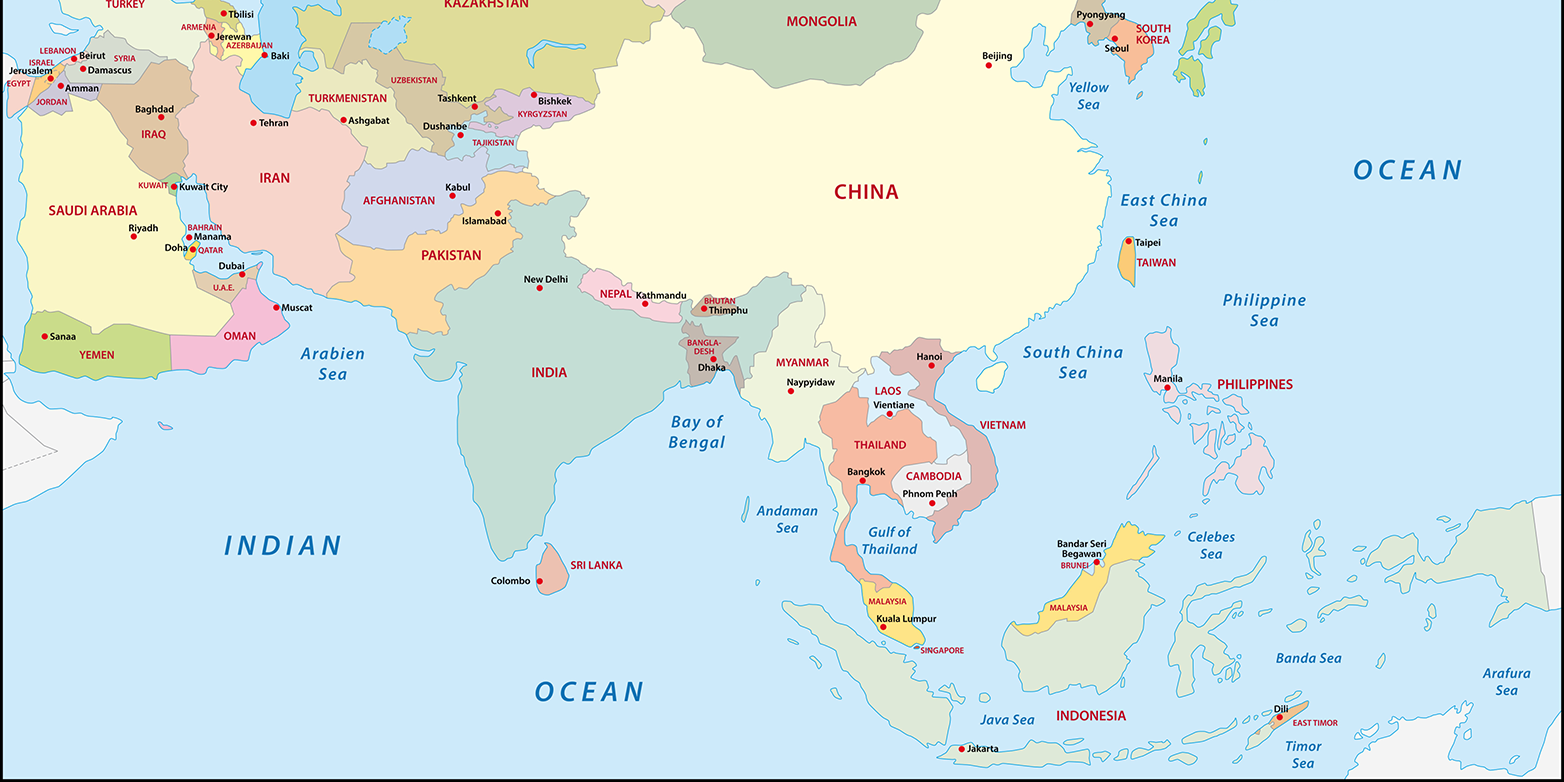Security in Asia also affects Europe
To benefit from stability and security in Asia, Europe must rethink its relations and engagement with this region. But, as Linda Maduz points out, it is worth taking a nuanced look at the various Asian countries.

Asia’s geopolitical weight is growing rapidly, forcing Europe to consider how it wants to engage with the region in the future. The continent is home not only to the world’s fastest growing markets, but also to security flashpoints of global importance, such as the South China Sea. These hotspots are becoming more volatile as a result of the US-China strategic competition, which has Asia as its main theatre. So what trends should European countries be aware of in their future dealings with the region?
The regional order in Asia is in flux, marked by a new underlying instability. Alongside its rise as a global economic power, China has over the past ten years increasingly asserted a claim to political leadership. It thereby challenges the US-led regional architecture that has been in place since 1945. In particular, China’s increased military activity in the area has raised the risk of conflict. Its growing economic dominance is also fuelling fears of overdependence. US efforts in recent years – along with allies and partners – to secure the existing order and thus its own leadership role in the region also contribute to the increasingly confrontational environment.

Today’s conflict dynamics weigh particularly heavily on Asia’s small and middle powers, such as Singapore and South Korea. Research and policy in the region, however, often focus on China and the United States. Middle powers with new regional ambitions, such as Australia, India and Japan, are also garnering attention. They want to play a part in shaping the emerging order in Asia and are seeking partnerships with European countries to do so. These states are taking the lead in entirely reconceptualising the region as the “Indo-Pacific”. Against this backdrop, formats for cooperation such as the Quadrilateral Security Dialogue or the AUKUS security partnership are being established or reactivated. In general, we’re seeing a trend away from multilateral toward minilateral solutions – but I believe these to be problematic, as they are often non-transparent and less inclusive. In other words, they are not necessarily in the strategic interest of smaller Asian countries.
Countries themselves are becoming polarised
These rapid regional upheavals are accompanied by destabilising domestic developments. Throughout the countries of Asia, polarisation along ethno-nationalist, religious and ideological lines is increasing. In addition, countries such as Indonesia, the Philippines and Thailand – long considered reliable international partners – are experiencing drastic democratic backsliding and a significant deterioration in their human rights situations. They are thus part of a trend that has been observable worldwide for a good 15 years and is detrimental to their political stability.
«During the first two years of the pandemic, 2020 and 2021, illiberal and authoritarian practices increased.»Linda Maduz
Under the current Thai government, for example, recent years have seen targeted assassinations of opposition members and the politically motivated dissolution of a major opposition party. During the first two years of the pandemic, 2020 and 2021, illiberal and authoritarian practices increased – especially under authoritarian regimes such as Cambodia. But all these developments are little known, and what amazes me is that reactions from Europe are either very moderate or absent altogether.
All in the same boat
This is all the more surprising, because during the pandemic, there was a growing awareness in Europe that its own strategic interests are closely linked to developments in Asia. The negative consequences of a disruption in trade routes and supply chains within and from the region – for example as a result of an outbreak of conflict – would also have tangible repercussions in Europe. These strategic ties are recognised in position papers on the Indo-Pacific by actors such as France, Germany, the Netherlands and the EU. In this sense, we are all in the same boat.
I am convinced that Europe can play a constructive role in maintaining peace, stability and security in Asia. Individual, grand geopolitical gestures, such as sending warships to the region – as we saw in 2021 – should be only one element of a more balanced and purposeful European engagement. Measures that I believe to be particularly important are those that strengthen and stabilize smaller states, such as the countries of Southeast Asia, and integrate them into overall regional solutions. In doing so, Europe could draw on its existing expertise in promoting democracy, the rule of law and multilateralism. It is essential to fortify the political and social stability and diversity of these countries. Their resilience will help determine how Asia will develop within complex conflicts and in light of major geopolitical shifts.
Comments
Additional comments are available for the German version of this article. Show all comments
Thank you for the great article. US and EU/Europe have always been distant from ethno-nationalist issues including terrorism and border expansionism ideologies. Asia has always been a far distant geography for the West. Especially in the case of terrorism, both US and EU were of the opinion that cross-border terrorism is a local bilateral issue that needs to be solved by India and Pakistan until 9/11 occurred, and then suddenly terrorism was a matter of concern around the globe. Likewise, expansionist ideologies by China with the neighboring countries also received a lukewarm response from the EU, for obvious reasons which are business and trade with China. Hence, the world should work together regardless of geographies and work towards a secure and stable society and economy.
Might be also interesting to think about how China is winning hearts and minds among the smaller countries of SE Asia and the Indo-Pacific through development aid and humanitarian action. Possibly even winning position over those countries like Australia, New Zealand and the US which have historically (also) dominated these activities in the region.
A great article at a time when, in particular, European countries need to readjust their coalition strategy. While it is very convenient to keep the current global economic drivers in place as they are (with the exclusion of Russia as a partner), it is paramount that Europe starts to change its position vis-a-vis China. Everything we can buy cheap from them today will cost us dearly in the future. But also Europe can no longer just count on the USA as the leader of NATO. The GOP has shown to us that they are not interested in protecting democracy, be it in the world or at home.
«During the first two years of the pandemic, 2020 and 2021, illiberal and authoritarian practices increased.» Not only in Asia.